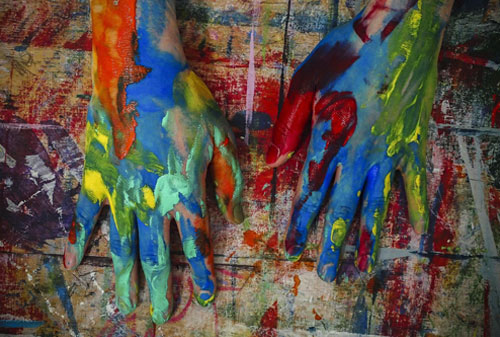




To support children's health, well-being, learning and development the children must have access to several stimuli which allow this. Sometimes it is easy to see the function of a toy or activity but the value of learning is less evident.
Everyday routines can be taken for granted which leads to missed opportunities for children to learn from them. Children undertake a variety of routines on a daily basis and it is essential for the adults supporting them to lead them positively in order to develop their independence.
The childcare worker should raise children's awareness of health and safety with the aim of keeping everyone safe at the setting and in the home. childcare workers have a huge influence on children's ability to develop their independence.
Independence can be promoted as part of everyday routines by:
A range of activities are needed which are suitable for the child's age and stage of development. These activities must be realistic so that every child is able to maximise them. Patience is required as not all children will manage to complete the task. Activities should not be completed on the child's behalf; this will not contribute to the individual's self-esteem nor confidence. Every effort should be praised as it is the taking part which is important, not the finished product. However, children need to be encouraged to do as much as possible for themselves and to seek to complete activities chosen by them, or provided for them.
The children need to be stimulated with questions which require much thought before answering. Closed questions support children's intellect.
Whatever material is offered to children they must meet health and safety guidance. By offering various material to children, their sensory development will be supported, which in turn contributes towards brain development. This provides an excellent opportunity as babies enjoy exploring for themselves using the five senses. Materials such as sand, water, clay, paint and modelling material provide opportunities to experiment, learning about the function of different materials and how this can change.
Playing with water: choosing hand tools, sharing, sense of success, gaining pleasure, sense of security, feeling of the water, learning to pour, understanding the purpose of water, trialling ideas, understanding the meaning of full and empty, floating and sinking, focussing, learning a new vocabulary, the sound of water
Playing with sand: playing alongside others, interacting, pleasurable experience, building confidence, feel and texture of the sand, using different skills to play with dry/wet sand, control over bodily movements, understanding characteristics of the sand, learning about absorbency, focussing, expressing ideas
Using paint: making choices, sharing experiences, gaining pleasure, building confidence during messy play, developing manipulative skills, controlling bodily movements, gaining confidence to use tools, self-esteem, mixing colours, showing understanding, experimenting, creating patterns, describing
Materials: children come across different textures on a regular basis and it is important for them to touch and explore them. By doing so they will learn new concepts, soft, hard, smooth, coarse, hairy, shiny, transparent, slippery, grainy. Feeling soft things makes the child feel good. Children touch smooth things regularly: stone, window glass, piece of satin. You can draw the child's attention to the fact that smooth things have no holes or coarse parts. They can experiment with slippery materials - racing ice cubes, trying to turn a door knob with oily hands. Learning about the feeling of running grain through their hands, writing in it. Running marbles over a smooth surface and then a coarse surface, noting the difference.
By receiving experiences children will develop their curiosity and learn to think and solve problems. The children's interests need to be followed and considered when planning. Sometimes plans will need to change, taking a spontaneous approach in order to satisfy the child's curiosity. They will learn a great deal in discovering results and then reflecting on the learning. Playing an active role promotes mental development which assists children to use what they already know as a tool to learn new things. The childcare worker will undertake the role of facilitator rather than telling the children what to do. Questions which challenge the children to deal with experiences easily and creatively will need to be asked. If children are having fun and see the purpose of what they are doing they will be more likely to develop skills.
Er mwyn cefnogi iechyd, llesiant a dysgu a datblygiad plant mae’n hanfodol bod y plant yn cael mynediad at sawl symbyliad a fydd yn caniatáu hyn. Weithiau mae’n hawdd gweld beth yw swyddogaeth tegan neu weithgaredd ond nid yw gwerth y dysgu mor amlwg.
Gall arferion bob dydd gael eu cymryd yn ganiataol gan fethu cyfleoedd i blant ddysgu ohonynt. Mae yna amrywiaeth o arferion sy’n cael eu cyflawni yn ddyddiol gan blant ac mae’n hanfodol bod yr oedolion sy’n eu cefnogi yn eu harwain yn gadarnhaol i ddatblygu’n annibynnol.
Dylai’r ymarferwr godi ymwybyddiaeth plant o iechyd a diogelwch gyda’r nod o gadw pawb yn ddiogel yn y lleoliad ac yn y cartref. Mae gan gweithiwyr gofal plant ddylanwad mawr ar allu plant i ddatblygu’n annibynnol.
Gellir annog annibyniaeth yn ystod arferion pob dydd wrth wneud y canlynol:
Mae angen amrediad o weithgareddau sydd yn addas ar gyfer oed a cham datblygiad y plentyn. Rhaid i’r gweithgareddau a ddarperir fod yn realistig fel bod pob plentyn yn medru manteisio a chael y mwyaf allan ohonynt. Mae angen bod yn amyneddgar gan nad yw pob plentyn yn dod i ben â chwblhau’r dasg. Ni ddylid cwblhau gweithgaredd ar ran y plentyn; ni fydd hyn yn cyfrannu at hunan-barch na hyder yr unigolyn. Mae angen cynnig canmoliaeth am bob ymdrech gan mai’r broses o gymryd rhan sy’n bwysig nid y cynnyrch terfynol. Serch hyn, mae angen annog plant i wneud gymaint â phosib dros eu hunain ac i geisio cwblhau gweithgareddau a ddewisir ganddynt, neu a ddarperir iddynt.
Mae angen symbylu’r plentyn gyda chwestiynau ble bydd angen meddwl yn ddwys cyn ateb. Nid yw cwestiynau caeedig yn cefnogi deallusrwydd plant.
Pa bynnag ddeunydd sydd yn cael ei gynnig i blant mae’n hanfodol eu bod yn cwrdd â chanllawiau iechyd a diogelwch. Wrth gynnig deunyddiau amrywiol i blant, byddant yn cyfrannu tuag at ddatblygiad eu synhwyrau, sydd yn eu tro yn cyfrannu tuag at ddatblygiad yr ymennydd. Mae hyn yn gyfle gwych gan fod babanod yn mwynhau archwilio dros eu hunain gan ddefnyddio’r pum synnwyr. Bydd deunyddiau megis tywod, dwr, clai, paent a deunydd modelu yn cynnig cyfleoedd i arbrofi gan ddysgu am swyddogaeth deunyddiau gwahanol a sut maent yn gallu newid.
Chwarae â dŵr: dewis offer llaw, rhannu, synnwyr o lwyddiant, cael pleser, ymwybyddiaeth o ddiogelwch, teimlad y dŵr, dysgu arllwys, deall beth yw pwrpas dŵr, treialu syniadau, deall ystyr llawn a gwag, arnofio a suddo, canolbwyntio, dysgu geirfa newydd, sŵn y dŵr.
Chwarae â thywod: chwarae ochr yn ochr ag eraill, rhyngweithio, profiad pleserus, datblygu hyder, teimlad a gwead y tywod, defnyddio sgiliau gwahanol wrth chwarae gyda thywod sych/ tywod gwlyb, rheolaeth dros symudiadau’r corff, deall priodweddau’r tywod, dysgu am amsugnedd, canolbwyntio, mynegi syniadau.
Defnyddio paent: gwneud dewisiadau, rhannu profiadau, cael pleser, datblygu hyder wrth chwarae anniben, datblygu sgiliau llawdriniol, rheoli symudiadau’r corff, datblygu hyder wrth ddefnyddio offer, hunan-barch, cymysgu lliwiau, dangos dealltwriaeth, arbrofi, creu patrymau, disgrifio.
Defnyddiau: daw plant ar draws gwahanol wead yn gyson ac mae’n bwysig eu bod yn cael eu cyffwrdd a’u harchwilio. Trwy hyn byddant yn dysgu cysyniadau newydd, meddal, caled, llyfn, garw, blewog, sgleiniog, tryloyw, llithrig, graenog. Mae teimlo pethau meddal yn gwneud i’r plentyn teimlo’n dda. Mae plentyn yn cyffwrdd pethau llyfn yn gyson: carreg, gwydr y ffenest, darn o satin. Gallwch dynnu sylw’r plentyn at y ffaith nad oes unrhyw dyllau neu ddarnau garw mewn pethau llyfn. Gallant arbrofi gyda defnyddiau llithrig- rasio ciwbiau iâ, ceisio troi dolen drws ar ôl rhoi olew ar y dwylo. Dysgu am y teimlad o redeg graen trwy eu dwylo, ysgrifennu ynddo. Rhedeg marblis dros arwyneb llyfn ac yna garw gan ddarganfod y gwahaniaeth.
Trwy dderbyn profiadau bydd plant yn datblygu sgiliau chwilfrydedd, dysgu meddwl a datrys problemau. Mae angen dilyn diddordebau’r plentyn gan ystyried hyn wrth gynllunio. Weithiau bydd angen newid cynlluniau a dilyn trywydd sydd yn ddigymell er mwyn bodloni chwilfrydedd y plentyn. Bydd yn dysgu llawer wrth ddarganfod canlyniadau ac yna myfyrio ar y dysgu. Mae cymryd rhan weithredol yn hyrwyddo datblygiad meddyliol sydd yn gymorth i blant i ddefnyddio’r hyn maent eisoes yn gwybod fel adnodd i ddysgu pethau o’r newydd. Bydd rôl yr ymarferwr fel hwylusydd yn hytrach nag un sy’n dweud wrth y plant beth i’w wneud. Bydd angen gofyn cwestiynau a fydd yn herio’r plant i ddelio â’r profiadau yn hwylus ac yn greadigol. Os bydd plant yn cael hwyl ac yn gweld pwrpas yn yr hyn maent yn gwneud byddant yn fwy tebygol o ddatblygu sgiliau.
Complete the activity below.
Cwblhewch y gweithgaredd isod.